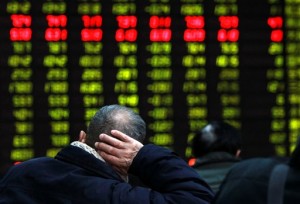
In this photo released by China’s Xinhua News Agency, an investor supports his head with a hand while looking at an electric stock price display at a trading hall in a securities firm in Shanghai, China, on Thursday, Feb. 21, 2013. AP FILE PHOTO
NEW YORK—Stocks are having a bad flashback to last spring, when fears about the European debt crisis sent the market spiraling lower.
On Monday, election results in Italy showed a race too close to call, leaving investors fearful that the country will struggle to form a government that can move forward with reforms to revive the economy.
The Dow Jones industrial average posted its worst drop in more than three months. The Standard & Poor’s 500, which had its first weekly decline of the year last week, piled on more losses Monday.
The Dow fell 216.40 points, or 1.6 percent, to 13,784.17, its biggest drop since November 7. The S&P 500 fell 27.75 points, or 1.8 percent, to 1,487.85, falling below 1,500 for the first time in three weeks. The Nasdaq composite dropped 45.57 points, or 1.4 percent, to 3,116.25.
Investors worry about the outcome of Italy’s election because it could set off another crisis of confidence in the region’s shared currency, the euro.
The Dow started the day gaining as much as 81 points on early optimism that Italian elections would produce a government willing to stay the course with reforms. The index drifted lower and then slumped, giving up about 150 points in the last hour of trading.
“This is what markets feared,” says Jim Russell, a senior equity strategist at US Bank Wealth Management. “Stability in Europe is paramount to the markets.”
Italy has the eighth largest economy in the world and the market for Italian government bonds ranks as the third largest, behind Japan and the US.
Last spring, investors fretted over the outcome of Greek elections that had the potential to pull the euro currency bloc apart. By the start of June, US stocks had given up the year’s gains after a strong start.
Monday’s drop in stocks may unnerve individual investors at a crucial moment.
For several years now, individual investors have been selling more stocks that they’ve been buying. In the first six weeks of this year, they reversed course. They put $21 billion more into US stock mutual funds than they took out, according to the Investment Company Institute, a trade group.
The market drop raised the possibility they could get rattled and start pulling money out again. The slide followed a big fall last week after the Federal Reserve released minutes from its last policy meeting. The minutes showed that members disagreed on how much longer the central bank should buy bonds to stimulate the economy. The Dow fell 155 points in two days.
As investors sold stocks Monday, they piled into bonds. The yield on the 10-year Treasury note, which is widely considered an ultra-safe investment, fell. The yield declined to 1.88 percent from 1.96 percent late Friday.
The VIX index, a measure of how volatile investors expect the stock market to be, surged 34 percent to 19, the biggest one-day rise since August 2011.
In Italy, investors erased most of an early rally in the country’s stock market and dumped government bonds, sending yields higher.
The yield on Italy’s 10-year government bond shot up to 4.43 percent from 4.12 percent early in the day, a sign that investors’ confidence in the government was dimming quickly.
In the US, some analysts say the stock market had gotten ahead of itself with a strong rally since the start of the year. The news from Italy gave investors a reason to sell. Even after today’s sell-off the Dow is still up 5.2 percent for the year and the S&P 500 is 4.3 percent higher.
“The market is extremely overbought, it’s been overbought since the beginning of this year,” says Lance Roberts, chief economist at Streettalk Advisors in Houston, Texas.
US Bank Wealth Management’s Russell says many investors were already jittery because the big jump in stocks. Now they have two reasons to sell: Italy, and the automatic budget cuts set to take effect Friday if lawmakers do not hammer out a debt-reduction deal.
“Markets have probably gone up too far, too fast,” Russell says. “They were due for pause.”
European stocks gave back much of their early gains. Benchmark indexes rose 0.4 percent in France, 1.5 percent in Germany and 0.8 percent in Spain.
Britain’s index was up just 0.3 percent after Moody’s stripped the country late Friday of its triple-A credit rating.
Among other stocks making big moves:
—Drugmaker Affymax plunged $14.10, or 85 percent, to $2.42 after the company recalled its anemia drug following severe allergic reactions and the deaths of some kidney dialysis patients.
—Mead Johnson fell $3.64, or 4.6 percent, to $75.32 after the company said that a new regulation in Hong Kong could affect the company’s sales there as well as in mainland China.
—Barnes & Noble rose $1.55, or 12 percent, to $15.06 after founder and chairman Leonard Riggio told the bookseller he is going to try to buy the company’s retail business.
—Hertz advanced 31 cents, or 1.7 percent, to $19.04, despite posting a fourth-quarter loss, after the rental car company said that pricing improved, volume rose and it cut costs.
——–
AP Business Writers Christina Rexrode and Matthew Craft contributed to the report.

